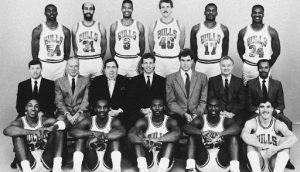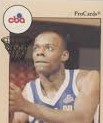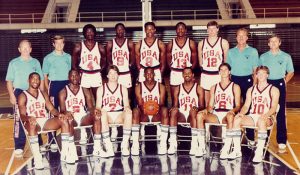When the NCAA tourney got canceled in March we entered a whole new world, which included a sports void the likes of which we have never seen before. The fine folks at ESPN came to the rescue in mid-April with “The Last Dance”, a 10-part miniseries about the 1998 Chicago Bulls and their quest to win a 6th NBA title in an 8-year span before Coach Phil Jackson and most of his star players all went their separate ways. While it has been comforting to spend the past several Sunday nights with behind-the-scenes stories from Steve Kerr/Scottie Pippen/Dennis Rodman, the star of the show as always is Michael Jordan. Even though the documentary concluded on May 17th, HoopsHD’s Jon Teitel has dug through his archives and discovered oodles of unpublished interviews about Jordan’s career, from his early days as the leading scorer for team USA at the 1983 Pan Am Games to a 55-PT playoff performance during Chicago’s final title run in 1998. We continue our trip down memory lane by chatting with Gene Littles about working as an assistant in Chicago to Doug Collins.
 (photo credit: history.bulls.com)
(photo credit: history.bulls.com)
In 1959 at McKinley Tech you were 1 of the best basketball players in the metropolitan DC area and were named to the All-Met team along with future NBA #1 overall pick Fred Hetzel, future NCAA championship coach John Thompson, and future Notre Dame president Edward Malloy: what was the DC basketball scene like back then, and could you ever imagine that your fellow players would go on to success in such diverse fields? Back in the day we played for the fun of the game: it was not like today where everyone wants to make it to the NBA. We just wanted to be the best players in our neighborhood/city.
You were an NAIA All-American at High Point: what did it mean to you to win such an outstanding honor? It was exciting to find myself in a situation where I made the All-American team 3 out of 4 years. I would have also made it as a freshman if I had not broken my hand. At the time it was just called High Point College so I was just trying to get a degree. It was a big honor to be named all-state alongside players from Duke/UNC.
You remain the all-time leading scorer in school history with 2398 PTS: did you realize at the time how prolific a player you were, and do you think that anyone will ever break your record? I think that it will be tough to break because good players just do not stay in school anymore after the scouting service tells them how great they are. Being from DC the closest pro team back then was the Baltimore Bullets so we did not see NBA games and did not think about getting to the next level.
In the spring of 1969 you were drafted in the 5th round of the NBA draft by New York (4 spots behind Willie Wise) and in the ABA draft by Dallas: did you ever consider going to the NBA, and why did you decide to join the ABA? The NBA was paying more money and was trying to buy up all of the young players. I wanted to stay in Carolina and be around my son but it is a whole different ballgame nowadays. I later got to know Knicks coach Red Holzman at coaching meetings and realized that I could have come off the bench behind Hall of Famers like Walt Frazier/Earl Monroe. However, I felt no regrets and had a good career.
In 1973 as a player for Carolina you lost Game 7 of the Eastern Division Finals to Kentucky: how close did you come to winning it all, and what was the reaction like in your locker room afterwards? We should have beaten the Colonels. I was the backup PG and scored about 17 PPG off the bench. I did not finish the game and we ended up losing a close 1. It was a great series and probably our best season in Carolina.
In 1975 you won the ABA title in your only season with Kentucky while playing with Artis Gilmore/Dan Issel: where do those 2 players rank among the best you ever played with, and what did it mean to you to win the title? I still have my ring and put it on every so often: if you are going to have a championship ring you should wear it! If you watch Hubie Brown on TV you will sometimes see him wearing his own ring. We challenged 1975 NBA champ Golden State to a “Super Game” but they turned us down. It was quite an honor to play with a pair of Hall of Famers in Artis/Dan: I later worked an an assistant under Dan. We had great camaraderie as well as our own plane, which most other teams did not have.
Your coach in Kentucky was Hubie Brown: what made him such a great coach, and what was the most important thing you ever learned from him? I played for a lot of different coaches in the ABA and Hubie was the most prepared coach I ever played for. If you see him on TV you will hear him talk about all of the stats/tendencies of every single player. He was a no-nonsense coach even during practice.
After your playing career you were a head coach/assistant coach for several different NBA teams, including the Chicago Bulls during the Michael Jordan era: what is the biggest difference between being a head coach and being an assistant? You have a different relationship when you are an assistant because you can tell them what they want to hear. However, as a head coach you have to tell them exactly how it is and you cannot deviate from that. Moving over that 1 seat on the bench makes it a whole different game: there is a lot more stress/pressure.
You currently coach youth basketball teams in Arizona: how do you like it, and what do you hope to do in the future? I love the youth game. My son Gino played on an AAU team in high school and I enjoyed working with him and traveling to national tournaments. Stanley Johnson was 1 of my players and we were ranked as high as #2 in the country in our division. It was exciting to see a bunch of 14-year olds grow up and then make it to college.
When people look back on your career, how do you want to be remembered the most? I guess just as a person who loved the game. I did not play for the honors/rewards/recognition: I always played for the fun of it. I loved the game and played hard.







